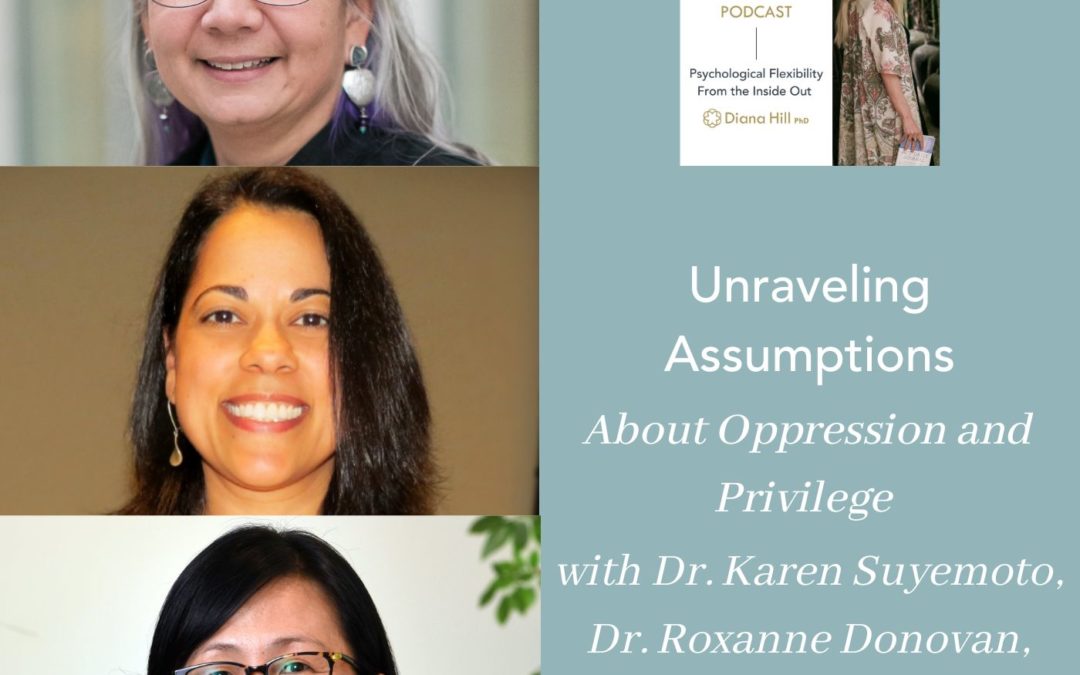Being an advocate, ally or accomplice for social justice is an ongoing process that at times is uncomfortable. This week, on the podcast, Dr. Karen Suyemoto, Dr. Roxanne Donovan and Dr. Grace Kim encourage us to unravel some of our assumptions about race, ethnicity, sexuality, gender, class, and ability. You will take perspective on your intersecting identities, learn about the messines of taking action at the individual, interpersonal and institutional level, and how to continue your growth and learning.
Listen and Learn:
- Why it is so hard to talk about race
- Why language is important when talking about different identities
- The definition of privilege and oppression
- The limitations of being “color blind”
- The process of racial identity development
- The difference between being an advocate and being an ally/accomplice
- The messiness of taking social justice action
- Examples of taking social justice action at the individual, interpersonal and institutional level
- Resources to continue your learning and action toward social justice
About Dr. Karen Suyemoto
Dr. Karen L. Suyemoto is Professor of Clinical Psychology and Asian American Studies and core faculty for the Critical Ethnic and Community Studies graduate program at the University of Massachusetts, Boston. Her teaching, research, and consultations focus on how racism and oppression affect mental health, psychological aspects of advocacy and resistance against racism and oppression, and how we may develop individually, relationally, and organizationally to resist oppression and promote anti-racism, particularly through education and in psychological practice. Dr. Suyemoto has served as President of the national Asian American Psychological Association, and the Chair of the American Psychological Association’s Task Force for the recently released Guidelines for Race and Ethnicity in Psychology. She was recognized as a White House Champion of Change: Asian American Pacific Islander Women under the Obama administration.
About Dr. Roxanne Donovan
Dr. Roxanne Donovan is a psychologist, writer, and professor of Psychological Science at Kennesaw State University. She has published numerous works on well-being and social justice. Her two coauthored books, Teaching Diversity Relationally and Unraveling Assumptions, bring a psychological, relational, and systems perspective to teaching and learning about diversity. Her popular “Wellness Wednesday” newsletter focuses on helping faculty of color and other scholars design purpose-driven lives of meaning, fulfillment, and vitality.
About Dr. Grace Kim
Dr. Grace S. Kim is a clinical associate professor in the Counseling Psychology & Applied Human Development Department at Boston University Wheelock College of Education & Human Development. Dr. Kim was trained in clinical psychology and researches social justice education and Asian American psychology. She explores how students understand the meanings of diversity; how to teach diversity and social justice effectively; and how to train future professionals to be more culturally humble and responsive. She also focuses on resilience and the mental health of Asian Americans, centering their struggles for liberation, social agency, and solidarity with other marginalized groups. Dr. Kim is the co-author of two books, Unraveling Assumptions: A Primer for Understanding Oppression and Privilege, and Teaching Diversity Relationally: Engaging Emotions and Embracing Possibilities. She is a fellow of American Psychological Association (Divisions 35 & 45) and Asian American Psychological Association.
Related Resources
- NEW, COMING SOON: Become a MORE Life in Process member to support the show.
- You’ll be designated as a “Founding Member” as we build a community to discuss ideas and our practice from the show. Founding Members receive exclusive bonus content from Diana
- Download Your Daily Practice for this episode
- Find out what kind of Striver you are and get your free Skillful Striving Toolkit
- Want to learn more about ACT? Take Diana’s on-demand course Foundations of ACT
- Learn more about Dr. Karen Suyemoto
- Learn more about Dr. Roxanne Donovan
- Learn more about Dr. Grace Kim
- Read the book Unraveling Assumptions: A Primer for Understanding Oppression and Privilege
- Read the book Teaching Diversity Relationally: Engaging Emotions and Embracing Possibilities
- Listen to the Liberation Now podcast!
- Sign-up for Dr. Roxanne Donovan’s Wellness Wednesdays Newsletter
Diana’s Events
- Reserve your spot in Diana’s Reset and Restore Retreat in Costa Rica in 2023!
- Sign up for Diana’s From Striving to Thriving Summit!
- See Diana at an upcoming event
Connecting With Diana
Thank you for listening to Your Life in Process! Subscribe to the podcast for free on Apple Podcasts, Spotify, Google Podcasts. If you have any questions or feedback you can contact Diana by email podcast at yourlifeinprocess dot com or leave Diana an audio message at (805) 457-2776. Follow Diana at YouTube, Instagram, LinkedIn, Facebook, and Diana’s website.
Thank you to the team Craig, Angela Stubbs, and Ashley Hiatt. Thank you to Benjamin Gould of Bell & Branch for your beautiful music.
Remember when you become psychologically flexible, you become free.


